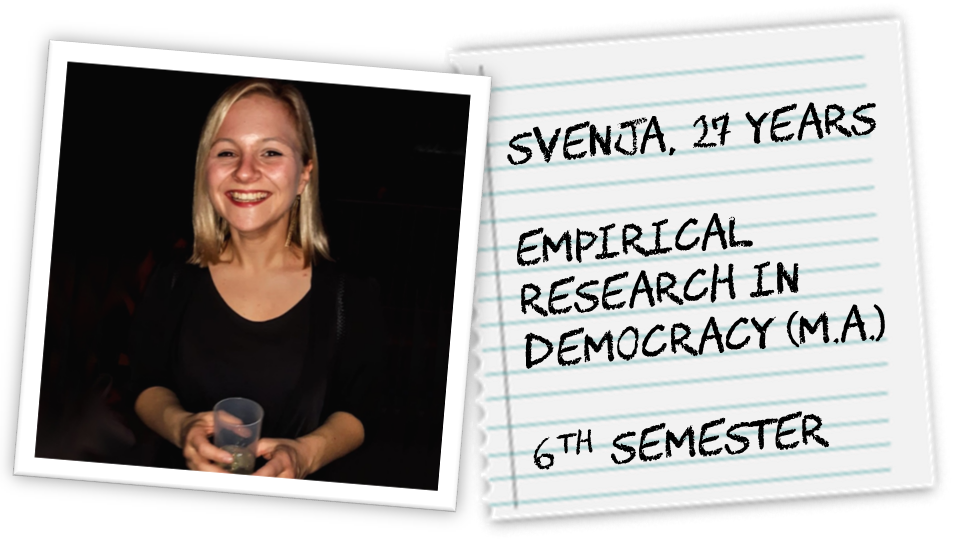
"The political science degree is very broad. [...] I also really like the atmosphere at the institute. They have a very lively student council, interesting additional courses, and lecturers who concern themselves with the interests of the students. "
Why did you choose to study political science? What interested or motivated you at the time?
When I was in high school I wanted to be a journalist. However, as I was getting ready to pursue this career, I was advised to not only study journalism, but also something about which I could later write/report. Because I have always been interested in politics, I decided to study political science. During my bachelors and a couple of internships, I moved further and further away from my initial career choice and discovered extracurricular political education. Because of this I’ve chosen to do a masters in political science (Empirical Research in Democracy) instead of in journalism.
What positively surprised you about the degree? What did you not expect?
During my studies I learned above all to look at connections and political phenomena analytically. Despite my initial expectations, the bachelor’s program was less concerned with daily political events. Instead, a large part of the degree was aimed at acquiring the tools to be able to analyse political systems, players, and decisions. Now at the end of my studies, I have realized that what initially seemed somewhat tedious and dry, is the biggest strength of the program.
What is special about your degree or course of studies, in your opinion?
I see political science as an attempt to analytically comprehend, explain, and predict social and political events and developments. As subjective as politics and individual political decisions are, political science tries to analyse these objectively. Even if a completely neutral analysis is never possible (and this is true for any subject), political science tries to explain political opinions, decisions, and systems, with the help of interdependent, comprehensible measurement instruments and analyses. Although this procedure must first be learned, sometimes with some effort, it helps you later to understand complex political contexts and to develop alternatives and solutions.
What are the particular focus points of your degree and later professional fields?
The political science degree is very broad. In Mainz you work your way through five content-based modules: economics and society, international relationships, analysis and comparison of political systems, Germany’s political system, and political theory. In the modules in the bachelor’s program as well as in the master’s program, you can chose your focal points based on your interests. I decided to focus on international relationships and the German political system, and more specifically on the European Union and the election of right-wing parties.
Potential career paths are just as varied as the subject itself. Political scientists can be found in federal and state ministries, international organizations, political parties and as assistants to members of parliament, in scientific institutions for political education, institutions for adult education, media, trade unions, business associations, management consultancies, PR, and advertising agencies, as well as libraries, archives, or documentation centers.
What do you especially like about Mainz as a place to study?
I see the broad range of courses in the political science degree as one of its strengths. After the bachelor’s degree, I found it difficult to decide on a specific subject area, so I was grateful to be able to continue working in the various areas of political science in the master’s program. I also really like the atmosphere at the institute. They have a very lively student council, interesting additional courses, and lecturers who concern themselves with the interests of the students. Furthermore, Mainz has won me over as a campus. Students from all fields of study can come together, giving you the opportunity to talk to different people, not only in class, but also in the cafeteria or in front of the library.
